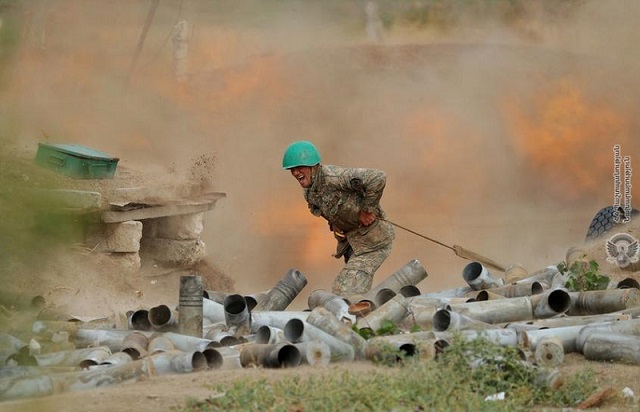
ISLAMABAD
Armenia must end its illegal occupation of Azerbaijani territories immediately and unconditionally, Azerbaijan’s ambassador to Pakistan reiterated on Thursday as he urged Armenian authorities to implement UN Security Council resolutions pertaining to the decades-long dispute.
Speaking at a news conference in Islamabad, Azeri envoy Ali Alizada blamed Armenia for embarking on a campaign of military aggression against his country. “My country wants peace. Our president has agreed to restart negotiations… but Armenia is acting contrary to the negotiation process and is trying to consolidate the status quo and its illegal occupation of Nagorno-Karabakh,” he said.
Highlighting that the United Nations had passed a resolution condemning Armenia for invading and seizing Azerbaijan’s territory, Alizada said the present round of provocations were being carried out by Armenia’s leadership in both ‘word and deed’, through actions such as participation in the inauguration of the occupied region’s self-proclaimed regime.
“Armenia’s Prime Minister Nikol Pashinian made a provocative statement, declaring ‘Karabakh is Armenia’, in the occupied city of Khankendi,” the envoy pointed out. “Armenia has introduced the concept of a new war for new territories. It has also put forward seven pre-conditions in conflict settlement negotiations along with attempting to change the format of talks, dealing a blow to the entire process mediated by the co-chairs of the Organisation of Security and Cooperation in Europe (OSCE) Minsk Group,” he added.
Alizada stressed that it was only in response to Armenian military aggression that Azerbaijan launched a counter-offensive and peace-enforcement initiative within the internationally recognised territories of Azerbaijan. He underscored that the move complied with article 51 of the UN charter that endorses a country’s right to self-defence. “It is Armenia’s military and political leadership who is responsible for escalation along the frontlines,” he said.
Alizada said the president of Azerbaijan had already stressed that his country has no military target in Armenia. “At the same time, Armenia is targeting our human settlements and civilian installations in violation of international humanitarian law and the Geneva Convention,” he said.
Not only that, the envoy said Armenian forces were targeting civilians in both their own country and occupied Azerbaijani territory to involve other parties in the conflict. “Azeri forces, on the other hand, are only targeting Armenian armed forces,” he asserted.
Alizada urged the international community to take immediate and concrete measures to bring an end to Armenia’s illegal occupation in Nagorno-Karabakh.
“The South Caucasus region will never have peace and security until Armenia ends its occupation,” he added.
The ambassador thanked Pakistan and Turkey for their unequivocal support. He said Pakistan’s Foreign Office had rejected rumours of the presence of Pakistani troops in Azerbaijan.
Meanwhile, Military Attaché of Azerbaijan Col Mehman Novruzov told reporters that the Azerbaijan army, after launching a counter offensive, has liberated 25 villages and one city. He added that by October 7, the Armenian army had lost 250 tanks, 270 artillery pieces, 60 air defence systems and one S-300 air defence system.
Azeri diplomat Samir Guliyev said that on September 27, 2020 the armed forces of Armenia blatantly violated the ceasefire and launched another aggression against Azerbaijan. While trying to compensate for its serious losses, Armenia tried to involve foreign nationals including mercenaries from different countries, he added.
The Nagorno-Karabakh region has been at the heart of tensions between Armenia and Azerbaijan for decades. Although recognised as a part of Azerbaijan under international law, it has been illegally occupied by Armenia since the early 1990s. Armenia also occupies seven of Azerbaijan’s provinces which amount to almost 20 per cent of the country’s territory.
Since 1992, a subset of OSCE members called the Minsk Group has been leading mediation efforts between Armenia and Azerbaijan. But even though the plan it proposed in 1997, that entails Armenian withdrawal from occupied Azerbaijani territory, was accepted by both Armenia and Azerbaijan, the situation has remained stalemated.
(WITH ADDITIONAL INFORMATION FROM AGENCIES AND NEWS DESK)




1723032398-0/BeFunky-collage-(36)1723032398-0-165x106.webp)













COMMENTS
Comments are moderated and generally will be posted if they are on-topic and not abusive.
For more information, please see our Comments FAQ